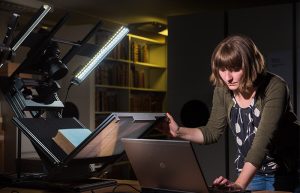Hannah Petrie works in Digital Humanities Archives and Documentation in the College’s Digital Humanities Team. Her expertise includes working with archived data, documenting research projects on the web, and text encoding with TEI. She is currently contributing to an XQuery- and XSLT-based text archive system as part of an AHRC research project. She was awarded an ADHO early career bursary, which enabled her to attend this conference. She attended this conference along with five of her colleagues from Exeter: Gary Stringer, Charlotte Tupman, Graham Fereday and Rich Holding from the Digital Humanities team, and PhD student Richard Graham.
This was my first time attending the annual Digital Humanities conference, and it’s certainly the biggest conference I’ve ever attended. We were told that at final count, there were 902 delegates from 45 different countries (to put it in perspective, the Digital Humanities congress that I attended in Sheffield in 2014 had 100 delegates). I went along with four of my colleagues from our Digital Humanities team in Exeter and one PhD student.
The main lecture theatre that we congregated in for the plenaries was impressively huge, and must have seated around 1200 people. The scale of the conference was reflected by the number of parallel sessions on offer. Eleven sessions ran concurrently throughout most of the conference, meaning that each one involved a difficult decision. Checking Storify feeds of tweet highlights from the conference, I felt like there was at least another conference-worth of additional material. I sometimes wanted to attend two or three sessions that were running at the same time, and wished that some of the sessions could have been recorded so that we could listen to the ones we missed afterwards.

